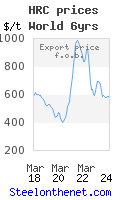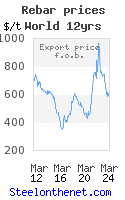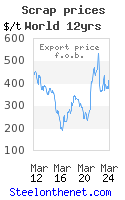Strategy and plant closures - Corus tinplate
This week saw an announcement from Corus concerning the possible reduction of capacity in Wales with the loss of up to 300 jobs at the steelmaker's tinplate operation in Llanelli [see http://icwales.icnetwork.co.uk/news/wales-news/2008/04/18/corus-to-lose-300-jobs-at-trostre-llanelli-91466-20784231/]. The planned reduction in capacity and headcount at Trostre it seems, is in response to overcapacity in global demand for tinplate.
The team at http://www.steelonthenet.com/ have for some time considered that - with no iron ore, a dependence on imported coal, high energy costs and expensive labour - there was little chance that UK iron and steelmaking would survive long-term. This view was reinforced by recent EU legislation concerning CO2 emissions, which can only result in further shifts of steelmaking from Western Europe to countries such as Brazil, Russia, India and China.
However, we always beleived that the future of UK steelmaking was in downstream steel products, where know-how, high value added, closeness to markets etc offset some of the economic disadvantages of making steel in the UK. The acquisition of Corus by Tata was, we also thought, a confirmation of our belief in the future of the UK steel sector downstream.
So this week's announcement about closure of downstream capacity at Corus comes as a bit of a surprise. With contraction of tinplate markets, and progressive relocation of automotive production and white goods manufacture to Central and Eastern Europe, it raises the question: what actually will Corus' new owners be left with in the UK, ten years down the line?
All clarifications / readers' comments concerning the strategic options for UK steelmaking welcomed!
blogger@steelonthenet.com
The team at http://www.steelonthenet.com/ have for some time considered that - with no iron ore, a dependence on imported coal, high energy costs and expensive labour - there was little chance that UK iron and steelmaking would survive long-term. This view was reinforced by recent EU legislation concerning CO2 emissions, which can only result in further shifts of steelmaking from Western Europe to countries such as Brazil, Russia, India and China.
However, we always beleived that the future of UK steelmaking was in downstream steel products, where know-how, high value added, closeness to markets etc offset some of the economic disadvantages of making steel in the UK. The acquisition of Corus by Tata was, we also thought, a confirmation of our belief in the future of the UK steel sector downstream.
So this week's announcement about closure of downstream capacity at Corus comes as a bit of a surprise. With contraction of tinplate markets, and progressive relocation of automotive production and white goods manufacture to Central and Eastern Europe, it raises the question: what actually will Corus' new owners be left with in the UK, ten years down the line?
All clarifications / readers' comments concerning the strategic options for UK steelmaking welcomed!
blogger@steelonthenet.com
Labels: Corus, steelmaking, strategy, UK, value added



